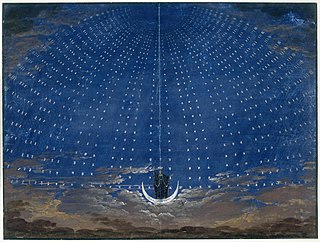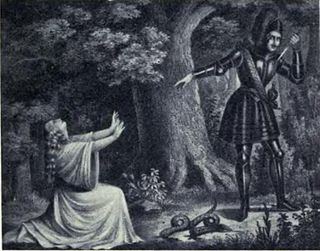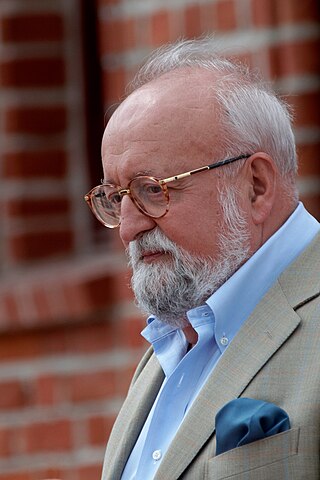Related Research Articles

The Magic Flute, K. 620, is an opera in two acts by Wolfgang Amadeus Mozart to a German libretto by Emanuel Schikaneder. The work is in the form of a Singspiel, a popular form during the time it was written that included both singing and spoken dialogue. The work premiered on 30 September 1791 at Schikaneder's theatre, the Freihaus-Theater auf der Wieden in Vienna, just two months before the composer's premature death. Still a staple of the opera repertory, its popularity was reflected by two immediate sequels, Peter Winter's Das Labyrinth oder Der Kampf mit den Elementen. Der Zauberflöte zweyter Theil (1798) and a fragmentary libretto by Johann Wolfgang von Goethe titled The Magic Flute Part Two.

Die Entführung aus dem Serail is a singspiel in three acts by Wolfgang Amadeus Mozart. The German libretto is by Gottlieb Stephanie, based on Christoph Friedrich Bretzner's Belmont und Constanze, oder Die Entführung aus dem Serail. The plot concerns the attempt of the hero Belmonte, assisted by his servant Pedrillo, to rescue his beloved Constanze from the seraglio of Pasha Selim. The work premiered on 16 July 1782 at the Vienna Burgtheater, with the composer conducting.

Fidelio, originally titled Leonore, oder Der Triumph der ehelichen Liebe, Op. 72, is the only opera by German composer Ludwig van Beethoven. The libretto was originally prepared by Joseph Sonnleithner from the French of Jean-Nicolas Bouilly. The opera premiered at Vienna's Theater an der Wien on 20 November 1805. The following year, Beethoven's friend Stephan von Breuning rewrote the libretto, shortening the work from three acts to two. After further work on the libretto by Georg Friedrich Treitschke, a final version was performed at the Kärntnertortheater on 23 May 1814. As these libretto revisions were going on, Beethoven was also revising some of the music. By convention, only the final version is called Fidelio, and the others are referred to as Leonore.
Iphigénie en Tauride is a 1779 opera by Christoph Willibald Gluck in four acts. It was his fifth opera for the French stage. The libretto was written by Nicolas-François Guillard.

Der Schauspieldirektor, K. 486, is a comic singspiel by Wolfgang Amadeus Mozart, set to a German libretto by Gottlieb Stephanie, an Austrian Schauspieldirektor. Originally, it was written because of "the imperial command" of the Holy Roman Emperor Joseph II who had invited 80 guests to a private luncheon. It is regarded as "a parody on the vanity of singers", who argue over status and pay.

Idomeneo, re di Creta ossia Ilia e Idamante is an Italian-language opera seria by Wolfgang Amadeus Mozart. The libretto was adapted by Giambattista Varesco from a French text by Antoine Danchet, based on a 1705 play by Crébillion père, which had been set to music by André Campra as Idoménée in 1712. Mozart and Varesco were commissioned in 1780 by Karl Theodor, Elector of Bavaria for a court carnival. He probably chose the subject, though it may have been Mozart. The work premiered on 29 January 1781 at the Cuvilliés Theatre in Munich, Germany.

Khovanshchina is an opera in five acts by Modest Mussorgsky. The work was written between 1872 and 1880 in St. Petersburg, Russia. The composer wrote the libretto based on historical sources. The opera was almost finished in piano score when the composer died in 1881, but the orchestration was almost entirely lacking.

Motezuma, RV 723, is an opera in three acts by Antonio Vivaldi with an Italian libretto by Alvise Giusti. The libretto is very loosely based on the life of the Aztec ruler Montezuma who died in 1520. The first performance was given in the Teatro Sant'Angelo in Venice on 14 November 1733. The music was thought to have been lost, but was discovered in 2002 in the archive of the music library of the Sing-Akademie zu Berlin. Its first fully staged performance in modern times took place in Düsseldorf, Germany, on 21 September 2005.

Die Feen is an opera in three acts by Richard Wagner. The German libretto was written by the composer after Carlo Gozzi's La donna serpente. Die Feen was Wagner's first completed opera, but remained unperformed in his lifetime. It has never established itself firmly in the operatic repertory although it receives occasional performances, on stage or in concert, most often in Germany. The opera is available on CD and in a heavily cut, adapted-for-children version, DVD.

I Medici is an opera in four acts composed by Ruggero Leoncavallo, with a libretto by the composer. Set in Renaissance Florence at the court of Lorenzo de' Medici, it was intended as the first part of a planned but unfinished trilogy called Crepusculum. The opera premiered on 6 November 1893 at the Teatro Dal Verme in Milan.

Doktor Faust is an opera by Ferruccio Busoni with a German libretto by the composer, based on the myth of Faust. Busoni worked on the opera, which he intended as his masterpiece, between 1916 and 1924, but it was still incomplete at the time of his death. His pupil Philipp Jarnach finished it. More recently, in 1982, Antony Beaumont completed the opera using sketches by Busoni that were previously thought to have been lost. Nancy Chamness published an analysis of the libretto to Doktor Faust and a comparison with Goethe's version.

Euryanthe is a German grand heroic-romantic opera by Carl Maria von Weber, first performed at the Theater am Kärntnertor in Vienna on 25 October 1823. Though acknowledged as one of Weber's most important operas, the work is rarely staged because of the weak libretto by Helmina von Chézy. Euryanthe is based on the 13th-century French romance L'Histoire du très-noble et chevalereux prince Gérard, comte de Nevers et la très-virtueuse et très chaste princesse Euriant de Savoye, sa mye.

The Marriage is a comic opera in 2 acts by Bohuslav Martinů, to the composer's own libretto, after the play of the same name by Nikolai Gogol. The opera was commissioned for television by the NBC, and the NBC Opera Theatre performed the work's world premiere on their television program NBC TV Opera Theatre for a national broadcast in the United States on 2 July 1953. The opera has subsequently been adapted for the stage and recorded on CD.

Ubu Rex is a satirical opera by Krzysztof Penderecki, on a libretto in German by the composer and Jerzy Jarocki, based on Alfred Jarry's 1896 play Ubu Roi. It uses models by Offenbach, Rossini, Shostakovich and Schnittke. The opera was premiered by the Bavarian State Opera on 6 July 1991 for the opening of the Munich Opera Festival, conducted by Michael Boder. The Polish premiere was 1993 in Grand Theatre, Łódź, conducted by Antoni Wicherek and directed by Lech Majewski.

Die Bürgschaft is an opera in three acts by Kurt Weill. Caspar Neher wrote the German libretto after the parable Der afrikanische Rechtspruch by Johann Gottfried Herder. Composed from August to October 1931, it was premiered on 10 March 1932 at the Städtische Oper in Berlin, Germany.

Der Templer und die Jüdin is an opera in three acts by Heinrich Marschner. The German libretto by Wilhelm August Wohlbrück was based on a number of intermediate works based in turn on Walter Scott's 1819 novel Ivanhoe.

Olimpie is an opera in three acts by Gaspare Spontini. The French libretto, by Armand-Michel Dieulafoy and Charles Brifaut, is based on the play of the same name by Voltaire (1761). Olimpie was first performed on 22 December 1819 by the Paris Opéra at the Salle Montansier. When sung in Italian or German, it is usually given the title Olimpia.

Agnes von Hohenstaufen is a German-language opera in three acts by the Italian composer Gaspare Spontini. The German libretto is by Ernst Benjamin Salomo Raupach. It was first staged at the Königliches Opernhaus, Berlin, on 12 June 1829. Raupach categorised Agnes von Hohenstaufen as a historical-romantic opera and it is one of a number of German works of the time set in the Middle Ages. Agnes also contains many of the features that would be characteristic of French Grand Opera. Spontini substantially reworked the piece for a revival in 1837.

The Gamblers, Op. 63, is an unfinished opera, composed by Dmitri Shostakovich in 1941/42 to his own libretto based on Nikolai Gogol's comedy The Gamblers (1842). The surviving first act lasts around 47 minutes. Krzysztof Meyer realised a completion in German, Die Spieler, in 1981. Both versions were performed on stage and recorded.
Doktor Johannes Faust, Op. 47, is an opera in three acts by Hermann Reutter. The libretto was written by Ludwig Andersen, based on an old puppet play Doktor Faust on the Faust topic. The opera was premiered by the Oper Frankfurt at its house on 26 May 1936, staged by Walter Felsenstein. It was published by Schott. A revised version was first performed at the Staatstheater Stuttgart on 8 June 1955, conducted by Ferdinand Leitner.
References
- ↑ Arden Must Die oxfordmusiconline.com
- ↑ Playbill, general rehearsal
- 1 2 3 Williams, Nicholas. "Arden must Die". In Sadie, Stanley (ed.). The New Grove Dictionary of Opera . Oxford University Press.